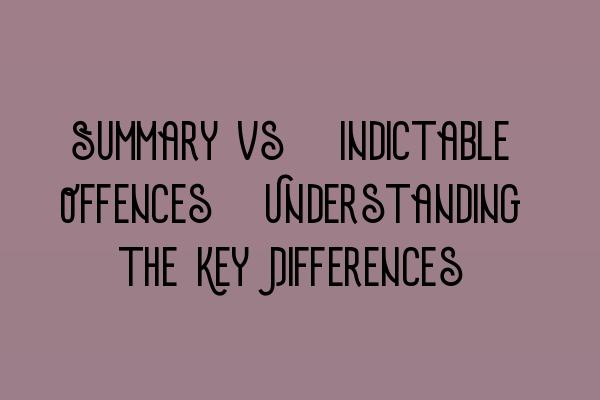Summary vs. Indictable Offences: Understanding the Key Differences
Welcome to the SQE Criminal Law & Practice Law UK blog! In this article, we will delve into the key differences between summary and indictable offences. Understanding these differences is crucial for aspiring solicitors and legal professionals.
What are Summary Offences?
Summary offences, also known as minor offences, are less serious crimes that are usually heard in the Magistrates’ Court. These offences include common assault, petty theft, and public order offences. Summary offences are typically punishable by fines, community service, or short prison sentences.
If you are preparing for the SQE 1 exam, it is essential to be familiar with summary offences and their corresponding laws. Practice your knowledge with our SQE 1 Practice Exam Questions resource, which will help you test your understanding of summary offences and related legal principles.
What are Indictable Offences?
Indictable offences, on the other hand, are more serious crimes that are typically tried by a judge and jury in the Crown Court. Examples of indictable offences include murder, rape, and large-scale fraud. These offences carry more severe penalties, such as lengthy prison sentences.
For SQE 1 and SQE 2 exam candidates, having a solid understanding of indictable offences is crucial. Our SQE 2 Preparation Courses offer comprehensive modules that cover the legal aspects of indictable offences in depth.
Key Differences between Summary and Indictable Offences
Now that we have defined summary and indictable offences, let’s explore some of the key differences between these two categories:
- Trial Procedure: Summary offences are usually dealt with in the Magistrates’ Court, where the case is heard by a magistrate or a panel of magistrates. Indictable offences, however, are tried in the Crown Court with a judge and a 12-member jury.
- Potential Penalties: Summary offences generally carry lighter penalties, such as fines, community service, or short prison sentences. Indictable offences can lead to more severe punishments, including lengthy imprisonment.
- Availability of Legal Representation: Defendants facing summary offences have the option to represent themselves, but they can also choose to be represented by a solicitor or a barrister. For indictable offences, legal representation is almost always necessary due to the complexities involved.
- Right to Trial by Jury: In summary offences, there is no automatic right to a trial by jury. By contrast, defendants facing indictable offences have the right to a trial by a jury of their peers.
Conclusion
To succeed in the field of criminal law, it is vital to differentiate between summary and indictable offences. Understanding the key differences between these two categories will enable you to appropriately advise clients, prepare cases, and navigate the legal system.
At SQE Criminal Law & Practice Law UK, we offer comprehensive preparation courses for both the SQE 1 and SQE 2 exams. Check out our SQE 1 Preparation Courses and make sure to stay up to date with the latest SRA SQE Exam Dates.
